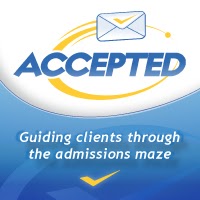This blog post originally appeared on Accepted Admissions Blog.

Writing the first draft of your personal statement is probably the hardest part of the whole application process. And it makes sense – it’s not easy to capture so much of your experience onto a single page.
Moving Your First Draft from Just OK to Simply Spectacular
I’ve read hundreds of first drafts over the years. Most were okay. Not stellar, but that could be polished up enough to probably win an interview at an average program.
But I’ve also read a few first drafts that totally blew me away, ones that told me the applicant would be accepted somewhere great. First drafts that, although the language might not be sharp or the organization might be terribly muddled, already contained the core of what would be an astounding final version. In fact, sometimes in the most focused, sharp sounding, well-written essays, applicants are just too focused on how their story sounds to really recognize what was special about it.
Write Big, Even When Word Counts are Small
When you allow your first draft to be expansive, writing and writing without worrying about limitations, wonderful things can happen. I frequently find the best ideas are hidden, just waiting to be pulled out and put center-stage. For instance, in the middle of one applicant’s four-page first draft, this gem was tucked away:
[The radiology attending] was pointing out how sometimes we forget that in interpretation that it is still an image and not an actual person. However, our interpretation will significantly impact the human and not the image. This same radiologist on a separate occasion while a resident and I were looking at a plain film of the chest brought up the same point, but in a very creative way. He pulled up a painting by René Magritte that said “This is not a Pipe.” In this painting, Magritte cleverly communicates with his viewers that it was truly not a pipe, but an “image” of a pipe.
This passage concealed an essential truth of how this applicant had come to view radiology. We brought it to the start of her personal statement, and used it to set the stage for an essay focused on the radiologist’s commitment to his patients:
“The Treachery of Images,” one of surrealist artist René Magritte’s most famous works, depicts an ordinary pipe with “this is not a pipe” written below it. While a resident and I examined a chest x-ray, our attending pulled out this image. I immediately understood his meaning. What we saw was not truly a pipe, only its image; similarly, a chest x-ray was only a representation of what we were really seeing. It was a reminder that what was revealed in these shadowed images – the reality behind the image – could be used to treat our patients.
Many things stand out about this introduction. This revelation about radiology is expressed in a creative way that shares something about the expanse of her education. The way she seems to effortlessly extrapolate these other aspects of her life to this chosen specialty implies a level of comfort with this specialty – a way of thinking of herself already as a practitioner of it. It also helped roll out a very clear structure for the essay focusing on how these images could help real people.
This applicant succeeded because she gave herself the freedom to write expansively in her first draft, expressing – albeit unknowingly – what was special in her story. Whatever your educational goal, try giving yourself this freedom, and allowing yourself to discover what is special about your own story.
Author bio: Cydney Foote, Accepted consultant and author of Write Your Way to Medical School, has helped future physicians craft winning applications since 2001. Want Cyd to help you get accepted? Click here to get in touch!






Leave a Reply